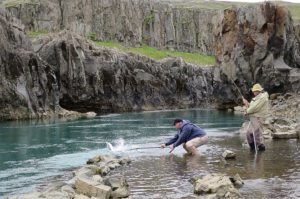Species: The two most sought-after species for fly fishing in Iceland are Atlantic salmon and 
Season: The fishing season in Iceland typically runs from mid-June to mid-September. The prime time for salmon fishing is usually from mid-July to mid-August, while trout fishing can be excellent throughout the season.
Rivers and Lakes: Iceland is home to numerous rivers and lakes that are well-suited for fly fishing. Some of the famous rivers include the Blanda, Laxá, and Vatnsdalsá. Many rivers are managed by fishing lodges or associations, and you’ll likely need to book in advance.
Guides and Lodges: It’s highly recommended to hire a local guide or stay at a fishing lodge, especially if you’re unfamiliar with the area. Guides can provide valuable insights into local fishing conditions, techniques, and regulations.
Regulations: Fishing regulations in Iceland are strict to protect the environment and fish populations. Make sure you’re aware of the rules regarding catch limits, fishing permits, and the use of barbless hooks.
Equipment: You’ll need appropriate fly fishing gear, including rods, reels, lines, and flies. Depending on the type of fishing you’re planning to do, you might need both single-handed and double-handed (spey) rods.
Clothing: Iceland’s weather can be unpredictable, so be prepared with appropriate clothing, including waterproof layers, waders, and sturdy footwear.Flies: Flies that mimic local insect species and prey are effective. Local fly shops or guides can recommend suitable patterns based on the time of year and the fish species you’re targeting.
Casting Techniques: Both single-handed and spey casting techniques are commonly used in Iceland. If you’re new to spey casting, consider practising before your trip.
Conservation: Practicing catch and release is encouraged, especially for Atlantic salmon, as it helps preserve fish populations for future generations.
Travel and Accommodation: Iceland has a well-developed tourism infrastructure, with options for accommodations ranging from hotels to fishing lodges. The capital city, Reykjavik, is often the starting point for many fishing trips.
Local Culture: Take the time to learn about the local customs and fishing culture in Iceland. Respecting the environment and the fishing traditions of the area will enhance your experience.
Remember that conditions can vary, so it’s a good idea to research and plan your trip well in advance. Local fishing guides and outfitters can provide tailored advice and assistance based on the specific area you intend to fish in.
